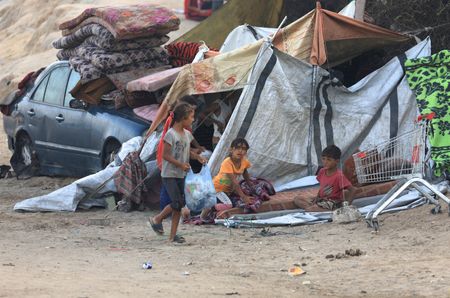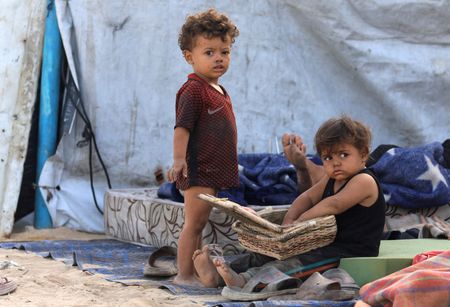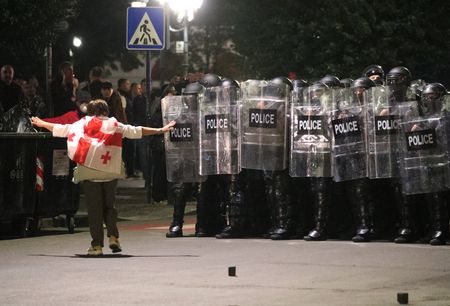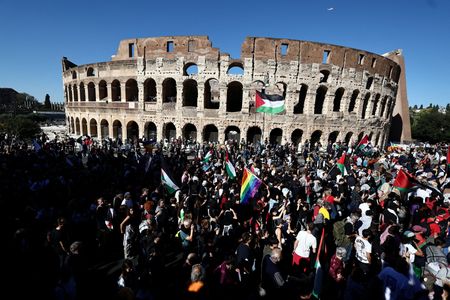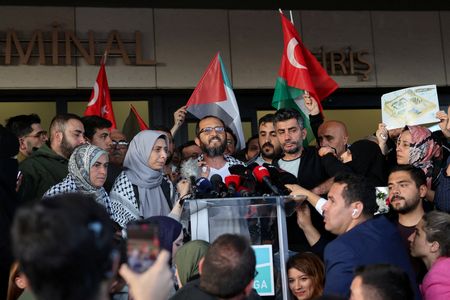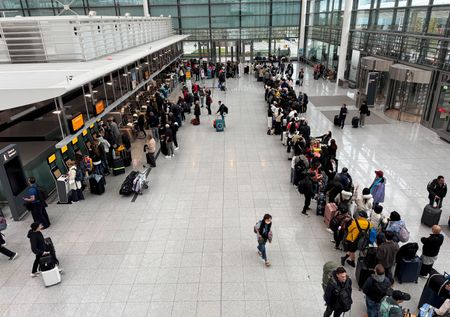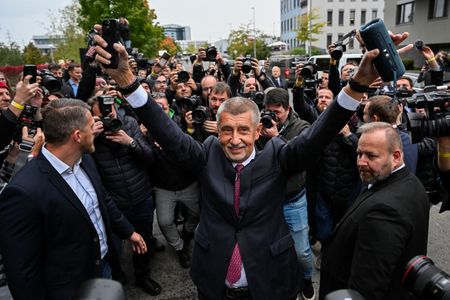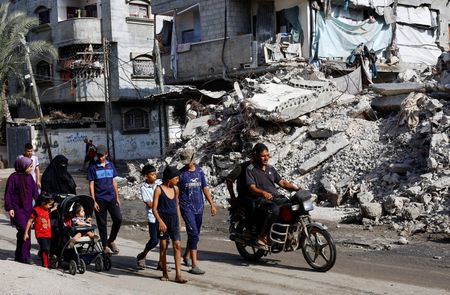By Nidal al-Mughrabi
CAIRO/GAZA (Reuters) -Dozens were killed in Israeli strikes on Gaza on Saturday, local health officials said, despite a demand from U.S. President Donald Trump for Israel to stop bombing in response to a declaration by Hamas that it was ready to free hostages under his plan to end the two-year-old war.
At least 36 people were killed in bombardments and airstrikes in the devastated Palestinian enclave since Trump demanded Israel halt its attacks late on Friday.
Eighteen people died in sporadic incidents, while 18 people, including children, were killed and several others wounded in an Israeli strike on a house in the Tuffah neighbourhood in Gaza City, medics said. The attack damaged several buildings nearby.
Israel said it had targeted a Hamas militant who had posed a threat to its troops in the area, and that reports of casualties were under review.
The military “regrets any harm caused to uninvolved civilians and works to mitigate harm to uninvolved civilians as much as possible,” it said in a statement.
TRUMP URGES HAMAS TO MOVE FAST ON HIS GAZA PLAN
On Saturday, Trump said he appreciated that Israel had “temporarily stopped the bombing,” and he urged Hamas, the Palestinian militant group that controls Gaza, to move quickly on his plan “or else all bets will be off.”
“I will not tolerate delay, which many think will happen, or any outcome where Gaza poses a threat again. Let’s get this done, FAST. Everyone will be treated fairly!” Trump said on his Truth Social platform.
Hamas had drawn a welcoming response from Trump on Friday by saying it accepted certain key parts of his 20-point peace proposal, including ending the war, Israel’s withdrawal, and the release of Israeli hostages and Palestinian captives.
But the group has left some questions unanswered, such as whether it would be willing to disarm, a key demand from Israel to end the war.
In Washington, a White House official said on Saturday that Trump was sending his envoys, Steve Witkoff and Jared Kushner, to Egypt to finalize the technical details of the hostage release and discuss a lasting peace deal.
Egypt will also host delegations from Israel and Hamas on Monday to discuss the anticipated exchange of Israeli hostages for Palestinian prisoners, the country’s Foreign Ministry said in a statement.
Israeli Prime Minister Benjamin Netanyahu addressed the nation late on Saturday after the Sabbath ended, confirming that negotiators would be sent to Egypt, and said the intention was to limit negotiations to a few days.
Netanyahu said he hoped to announce the return of the captives, all while the Israeli military remained deep in Gaza.
Hamas would be disarmed and Gaza demilitarized, Netanyahu said, according to his remarks carried by Israeli media, warning that it would happen either politically or militarily.
Trump’s plan sees the military eventually withdrawing to Gaza’s perimeter but does not lay out any time frame.
The prime minister spoke as tens of thousands took to the streets in Tel Aviv in support of a deal to end the war.
Hamas’ response to the plan drew a chorus of optimistic statements by world leaders, who urged an end to the deadliest conflict involving Israel since its creation in 1948 and called for the release of Israelis still held in the enclave.
Another possible boost to peace hopes came with a supportive statement from the Iran-backed Palestinian Islamic Jihad group, which is smaller than Hamas but seen as more hardline.
The group, which also holds hostages, on Saturday endorsed Hamas’ response – a move that could help pave the way for the release of Israelis still held by both parties.
PALESTINIANS LOOK FOR ‘RAY OF HOPE’ AFTER HAMAS RESPONSE
Hamas’ stance, and its backing by Islamic Jihad, may raise the spirit of Gazans, who had watched one ceasefire effort after another fail as Israeli strikes hit the strip over the past two years, creating a humanitarian crisis and displacing millions.
“May the suffering lift off the people of Gaza, the people of Gaza are among the oppressed of the earth, and any ray of hope for the oppressed people is a victory,” said Sharif al-Fakhouri, resident of the occupied West Bank city of Hebron.
Some Palestinians expressed fear that Netanyahu, who heads Israel’s most far-right government ever, will ultimately withdraw from any plan to end the war.
“What is important is that Netanyahu does not sabotage this, because now that Hamas agreed, Netanyahu will disagree, as he usually does,” said Jerusalem resident Jamal Shihada.
WORLDWIDE SUPPORT FOR END TO ‘HORRIFIC WAR’
Israeli media reported that the country’s political echelon had instructed the military to reduce offensive activity in Gaza.
Trump has invested significant political capital in efforts to end the war that has left U.S. ally Israel increasingly isolated on the world stage.
Trump said on Friday he believed Hamas had shown it was “ready for a lasting PEACE” and he put the onus on Netanyahu’s government.
Domestically, the prime minister is caught between growing pressure to end the war — from hostage families and a war-weary public — and demands from hardline members of his coalition who insist there must be no let-up in Israel’s campaign in Gaza.
Israeli far-right Finance Minister Bezalel Smotrich said on X that halting attacks on Gaza was a “grave mistake,” saying it would play into Hamas’ “time-wasting.”
Israel began attacking Gaza after the October 7, 2023, Hamas-led attack on Israel in which some 1,200 people were killed and 251 taken hostage, according to Israeli tallies. Israel says 48 hostages remain, 20 of whom are alive.
Israel’s campaign has killed more than 67,000 people in Gaza, most of them civilians, according to Gaza health authorities.
“It’s time to end this horrific war and bring every single hostage back home. We are for rebuilding and the rehabilitation,” said Efrat Machikawa, an active member of Israel’s hostage families forum and the niece of Gadi Moses, a hostage who was released in January.
(Additional reporting by Mohammed Torokman, Mussa Qawasma, Pesha Magid, Rami Amichay, Alexander Cornwell and Maher Hatem; Writing by Michael Georgy; Editing by Susan Fenton, William Maclean, Rod Nickel)

